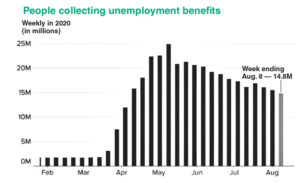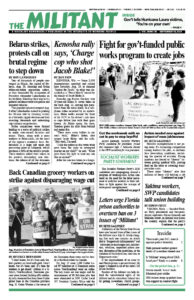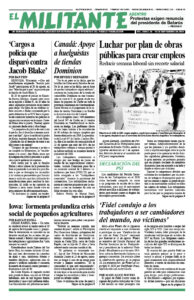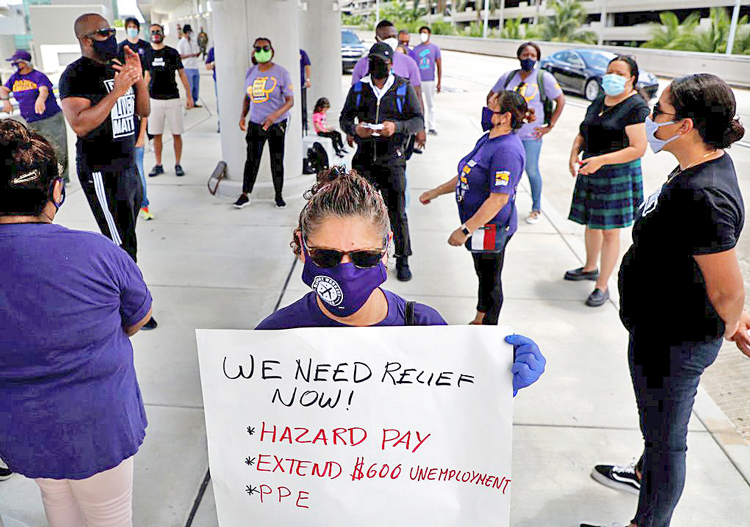Massive unemployment is not going away. It’s increasing competition among workers for jobs, as millions face devastating conditions, including the spectre of eviction. Rising numbers are forced to “choose” between paying medical bills, putting food on the table or covering transportation costs.
These same “choices” also face millions of those still holding a job because of wage cuts, the slashing of work hours and increased prices for basic necessities.
Many others know that while they can scrape by on what they make today, there is no guarantee that will be true next month or even next week.
The labor movement needs to organize a serious fight to overcome the biggest division we face today — between those with jobs and those without.
According to the U.S. government there were more than 27 million people collecting either unemployment benefits or “Pandemic Unemployment Assistance” as of Aug. 8. Countless others applied but haven’t been able to get through the bureaucratic maze. Others, including undocumented immigrants, are denied any government assistance.
Those collecting unemployment benefits saw their income plummet when the weekly $600 “enhanced” benefit program ended in early August. Meanwhile, the price of beef has gone up more than 20%, eggs 10.4% and poultry 8.6% since February.
Unemployment is officially at 10.2% after peaking at 15% in April. But this figure excludes some 7.7 million people who they call “discouraged” or “marginally attached” as well as 8.4 million who are working part time, but need a full-time job to survive.
The Labor Department says that 1.8 million jobs were added in July, the third month in a row of new hiring or bringing people back from furlough as government-imposed lockdowns are lifted.
More layoffs on the way
While many businesses are reopening, others are closed for good. Major companies, including MGM Resorts, Stanley Black & Decker, Salesforce.com, Coca-Cola, American Airlines and United Airlines, say they will soon lay off thousands.

The layoffs are not necessarily because the companies aren’t doing well. Salesforce.com, which provides software for accounting, just posted record quarterly sales and then announced it plans to lay off 1,000 of its 54,000 workers.
With tourism and air travel in the doldrums, American Airlines says that unless the government gives the company more handouts, it plans to lay off 17,500 union workers and 1,500 managers. United Airlines says it plans to furlough 2,850 pilots and eliminate as many as 36,000 workers overall by Oct. 1.
Aircraft company Boeing got rid of 5,500 workers earlier in the year by offering buyouts, another 6,800 were laid off in May, and says it plans even more cuts.
At the same time, with tax revenues down many local and state governments and public transportation systems are threatening big layoffs.
The pandemic accelerated cutthroat competition among capitalist businesses, leaving winners and losers. J.C. Penney, Neiman Marcus, J. Crew and Men’s Wearhouse ended up in bankruptcy. Walmart, Target and Amazon, exempt from the lockdowns, reaped super profits. Amazon bosses are making good on their expansion by hiring a big new levy of “indirect workers” — delivery drivers on an hourly wage responsible for maintaining their own vehicles, paying their own gas and with no health benefits.
Some bosses temporarily upped wages by $2 or $3 an hour in March, calling it “hazard pay” for “essential” workers, something they could take back at the drop of a hat. As sustained high unemployment has increased competition for jobs, the bosses tossed the extra pay out the window.
‘Shared sacrifice’ = pay cuts
Millions more never got the temporary boost. Instead, bosses promoted the lie that there must be “shared sacrifice.” What they mean is workers should sacrifice for the bosses’ profits. According to the Washington Post, some 4 million workers “sacrificed” for private companies with pay cuts over the last few months.
Tesla cut its lowest-paid workers’ wages 10%. Other companies that cut pay: General Motors, Occidental Petroleum, HCA Healthcare, Sotheby’s and Major League Baseball.
Retail workers who called into the Brian Lehrer show on New York’s WNYC radio Aug. 24, which focused on conditions workers face in retail, gave a feel for today’s reality.
“They cut our hours, they hired more people,” Dollar Tree worker Kay Devine in the Bronx told Lehrer. “I was doing 60 hours every two weeks. Now I’m down to 40.” With cutbacks in public transportation, the bus comes only twice an hour. “Many times, I walked to work,” she said. “Now they’re like, ‘Oh you came in late, go home.’”
Metropolitan Transportation Authority bosses are threatening to cut 40% more in New York bus and subway service and 50% in commuter rail if they don’t get more federal funding.
Some workers are refusing to take the cuts, using their unions to demand more. Retail workers at the Dominion grocery chain in Newfoundland, Canada, are setting an example, striking for full-time jobs and better wages.
Workshare schemes
One of the schemes bosses use to attack workers’ wages while they promote the myth that “we’re all in this together” is the so-called Workshare program.
Under this federally funded program bosses cut work hours — and weekly pay — instead of laying off some workers. The bosses can then claim they have “softened the blow” because workers get unemployment benefits that partially cover the lost hours. Of course, sooner or later, the benefits run out, in some states after only 26 weeks.
Job cuts are taking place worldwide. The Indian rulers recorded an unprecedented 50% drop in industrial production in April.
A union in every workplace
Workers need unions we can use to fight to defend our jobs, wages and working conditions. Instead of Workshare programs that drive down wages, workers and our unions should demand “cut the workweek with no cut in pay,” to share the available work around. And demand cost-of-living clauses in union contracts that ensure pay goes up every time there is inflation.
Workers need to fight for a massive government-funded public works program, to build the things that working people need: hospitals, schools and housing as well as repairs to decaying infrastructure like bridges and roads. This would both put millions to work and improve the living and work conditions we all face. As long as there are not sufficient jobs, everyone who is unemployed, whether they have “papers” or not, should get weekly jobless pay as long as they need it.


